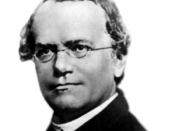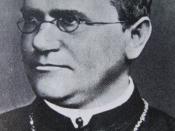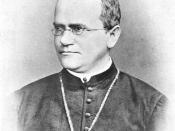GREGOR JOHANN MENDEL (1822-1884) Gregor Mendel is known as the "Father of Genetics". Gregor Mendel is an Austrian botanist and monk, formulated the basic laws of heredity. His experiments with the breeding of garden peas led to the development of the science of genetics.
Mendel was born in Heinzdorf, Austria (now Hynice, near Krnov, in what now is the Czech Replubic) on July 22, 1844. He died in Brunn on January 6 1884. His parents were peasants. He was an excellent student and decided to become a teacher. Many teachers at the time were priests. Therefore, in 1843, at the age of 21, Mendel entered the monastery of St. Thomas in Brunn, Austria now Brno, the Czech Replubic. He became a priest in 1847.
At the monastery, Mendel was exposed to many scholars. In 1851, the monastery sent him to study Science and Mathematics at the University of Vienna. He returned to the monastery in 1853 and taught Biology and Physics at a local high school for the next 14 years.
Mendel was elected abbot of the monastery. From then on, his administrative responsibilities limited his opportunities for research.
In his experiments, Mendel studied the inheritance of seven pairs of traits in garden pea plants and in their seeds. These pairs included (1) rounded or wrinkled seeds and (2) tall or short plants. His work was not recognized until 1990. Three Europeon bontanist scientist Hugo De Vries, Carl Correns, and Erich Tschermak independently arrived at similar results in their own work.
Mendel bred and crossbred thousands of plants and observed the characteristics of each sucessive generation. Like all organisms that reproduce sexually, pea plants produce their offspring through the union of special sex cells called gametes. In pea plants, a male gamete, or sperm cell, combines with a female gamete,


